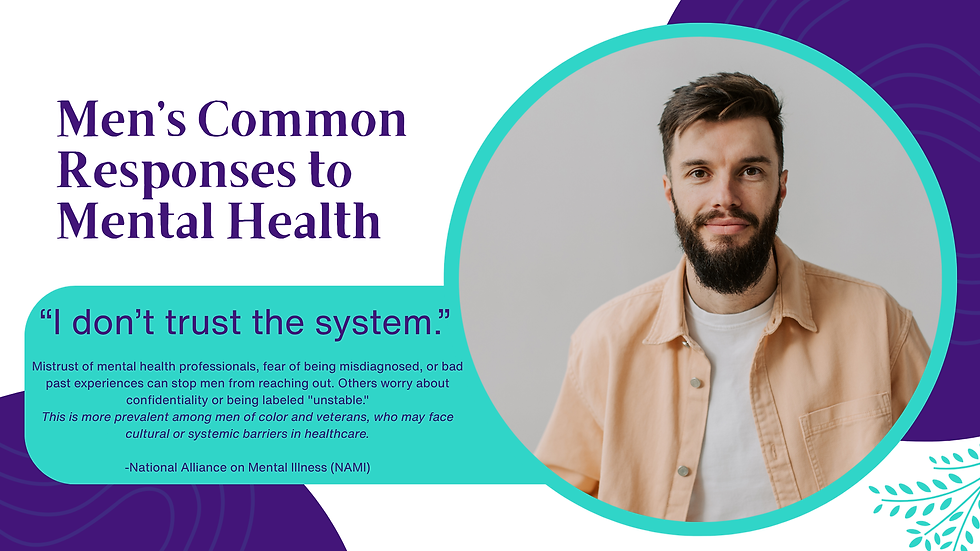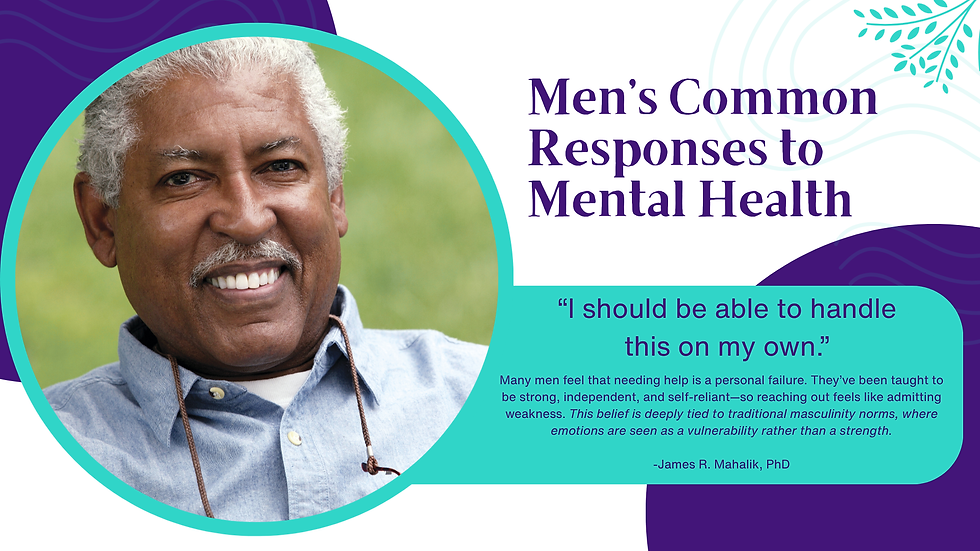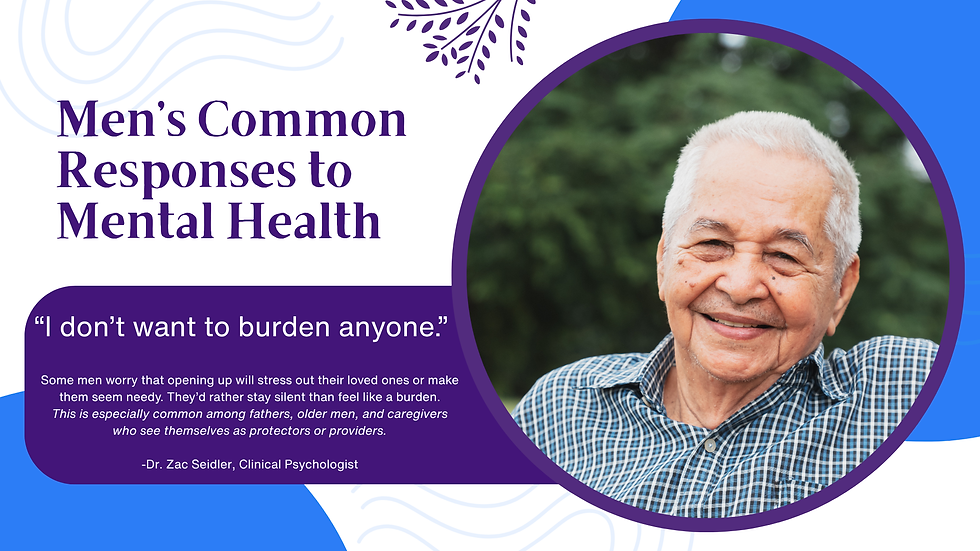Men’s Mental Health and Suicide: Understanding the Stigma with Accessing Support
- zacharyadam9
- Jun 13, 2025
- 4 min read
Mental health affects everyone—but for men, talking about it can feel especially hard. Many guys grow up hearing that they need to “tough it out” or “man up,” and that asking for help is a sign of weakness. That kind of pressure doesn’t just hurt—it can be deadly. Suicide is one of the leading causes of death for men in the U.S., and the numbers keep rising.
In 2023, nearly 49,300 people in the U.S. died by suicide. Men made up almost 80% of those deaths (American Foundation for Suicide Prevention, 2024). White men, especially older ones, are the most at risk, but this crisis affects men of all ages and backgrounds. If you live in a rural area or small town, the risk is even higher—some of the highest suicide rates in the country are in non-metro areas (CDC, 2022).

Why Are Men Struggling So Much?
There’s no single reason why men are at higher risk, but several issues stand out. First, men are much less likely to talk about what they’re going through or to reach out for help. In 2022, only about 17% of men said they got any kind of mental health support, compared to nearly 30% of women (SAMHSA, 2023). That doesn’t mean men aren’t struggling—it means many are suffering in silence.
Also, mental health problems can look different in men. Instead of showing sadness, men might act angry, feel constantly irritable, or take risks with things like drinking, drugs, or reckless behavior. These signs are often missed or misunderstood, which means a lot of men never get the support they need (American Psychological Association, 2023).

Why Don’t Men Talk About It?
There are a lot of reasons why men often keep their struggles bottled up:
They were taught not to show emotion. From a young age, many boys hear things like “don’t cry,” “toughen up,” or “real men don’t show feelings.” These messages teach them that vulnerability is something to hide, not express.
They fear being judged or seen as weak. Society often rewards stoicism in men, so admitting to anxiety, depression, or suicidal thoughts can feel like a failure—even though it’s not.
They don’t know how to talk about it. Some men want to open up but don’t have the words. If mental health was never talked about in their families or communities, it can feel confusing or even embarrassing to try.
They worry it won’t help. A lot of men believe that talking won’t actually solve their problems—or worse, that no one will understand. If they've been dismissed in the past, they might feel like no one will really listen.
They’re afraid of the consequences. Some worry that admitting they’re struggling might affect their job, relationships, or how others see them. The fear of being labeled or treated differently can keep people silent.
Understanding these barriers is key to breaking them down. We can all play a role by making it safer for men to open up—without fear of shame, rejection, or judgment.

How Do Most Men Die by Suicide?
One of the biggest reasons why suicide is so deadly for men is because of how they try to end their lives. The most common method by far is with a gun. Around 60% of men who die by suicide use a firearm (CDC, 2023). This is a big problem because gun-related suicide attempts are usually fatal—over 90% result in death (Harvard School of Public Health, 2022).
The second most common method is hanging or suffocation, followed by poisoning (like drug overdoses). But the bottom line is this: most men who attempt suicide use very lethal methods, which makes it harder to survive and get a second chance.
What Can We Do to Help?
Here’s the good news—suicide is preventable, and there are things we can all do to make a difference. One big step is reducing access to things that can make a crisis fatal—especially guns. Safe storage, like keeping firearms locked up and away from ammunition, can give someone the time they need to get help and survive.
We also need to change the way we talk about mental health. Asking for help is not weak—it’s one of the strongest things you can do. More men are starting to open up, and that’s something we should celebrate and support. If therapy feels out of reach, there are hotlines, support groups, and even apps that offer help when you need it most.

Friends and family can also make a huge difference. Just checking in and asking someone how they’re really doing—without judgment—can open the door to a life-saving conversation. When you're having that conversation, employ active listening skills, be empathetic to what they are going through, and provide reassurance that you will stand by them as they share their vulnerabilities.
Let’s Be There for Each Other
The truth is, many men are hurting, but they don’t have to go through it alone. If you or someone you love is struggling, don’t wait. Call the 988 Suicide & Crisis Lifeline, reach out to a friend, or talk to someone you trust. Your story doesn’t have to end here.
Let’s start making space for honest conversations, better access to care, and a culture where men are allowed to feel—and heal. We all need help sometimes. And it’s okay to ask.
Support Resources
988 Suicide & Crisis Lifeline – Call or text 988 anytime
National Alliance on Mental Illness (NAMI) – nami.org
HeadsUpGuys – A resource just for men: headsupguys.org
Sources
American Foundation for Suicide Prevention. (2024). Suicide statistics. https://afsp.org/suicide-statistics
American Psychological Association. (2023). Recognizing and treating depression in men. https://www.apa.org/news/press/releases/stress/2023/depression-men
Centers for Disease Control and Prevention. (2022). Disparities in suicide rates by urban-rural classification. https://www.cdc.gov/mmwr/volumes/71/wr/mm7128a1.htm
Centers for Disease Control and Prevention. (2023). Suicide means and methods. https://www.cdc.gov/nchs/products/databriefs/db455.htm
Centers for Disease Control and Prevention. (2024a). Provisional suicide mortality data — United States, 2023. https://www.cdc.gov/mmwr/volumes/73/wr/mm7315a1.htm
Harvard School of Public Health. (2022). Means matter: Lethality of suicide methods. https://www.hsph.harvard.edu/means-matter/means-matter/case-fatality/
Substance Abuse and Mental Health Services Administration. (2023). 2022 National Survey on Drug Use and Health. https://www.samhsa.gov/data/



